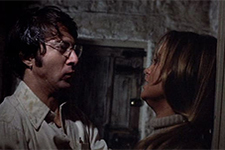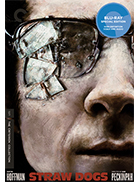Straw Dogs
|  Sam Peckinpah’s Straw Dogs is a great and troubling masterpiece, a film of such simultaneous depth and crudeness that it has elicited some of the most conflicted responses of his or any other filmmaker’s career. For every critic who found it the work of a great and terrible genius, there were those like Judith Crist who labeled it the worst film of 1971 and declared “All anyone with an IQ of 70-plus can get out of this film is a case of the heaves.” Sam Peckinpah’s Straw Dogs is a great and troubling masterpiece, a film of such simultaneous depth and crudeness that it has elicited some of the most conflicted responses of his or any other filmmaker’s career. For every critic who found it the work of a great and terrible genius, there were those like Judith Crist who labeled it the worst film of 1971 and declared “All anyone with an IQ of 70-plus can get out of this film is a case of the heaves.”Like Peckinpah’s brilliant revisionist Western The Wild Bunch (1969), Straw Dogs is not just a violent film, but a film about violence, which is what makes it so difficult to watch. Violent films (whether they be war films, or cop thrillers, or even horror films) are often easily digestible because we aren’t asked to consider the implications of the actions or in any way question our own complicity in the enjoyment of simulated bloodshed. So much cinematic violence is easy, fun, and escapist—it exists in its own thoughtless vacuum on the silver screen and never encroaches on our world. Peckinpah’s greatest contribution to modern filmmaking was not in making violence bloody and visceral in a way it had never been before, but in using that viscera to remind us of the nonchalant indifference we feel for so many of the victims of cinematic violence who die easy, painless deaths. Yet, at the same time, Peckinpah’s depictions of violence are eerily beautiful and often exhilarating; despite the apocalyptic horrors of hundreds of men getting torn to shreds at the end of The Wild Bunch, who can honestly say that it was not a vicariously exciting ride, as well? Thus, Peckinpah, more so than virtually any other filmmaker then or now, was able to tap into the terrible paradox of violence: it is both repulsive and fascinating, and those two responses can never be reconciled. Straw Dogs was Peckinpah’s first non-Western, but the same themes and obsessions that drove his earlier films are very much in evidence, even if transplanted to a different time and place. Dustin Hoffman (hot off the heels of The Graduate and Little Big Man) stars as David Sumner, an American mathematician who is escaping the social turmoil of the United States in the early 1970s by retreating with his British wife, Amy (Susan George), to her family farm in the Cornish countryside. David is an intellectual, a man who lives primarily inside his own head and is thus largely disconnected from everything else around him, including his own wife. His escaping the racial, political, and social problems of his native country is not so much a sign of his lack of commitment as it is a symptom of his deep inwardness—so intent is he on his mathematical theorems that he can’t be bothered by student war protests and the like. Unfortunately, he finds the Cornish moors to be no less distracting. Peckinpah establishes this visually by depicting the countryside in drab shades of brown and gray; there is little life to be found in the surrounding fields, and the stone village near their farm is characterized by tension and moral ambiguity (the opening shots of children playing in a graveyard reflect the sadistic play of the kids with ants and scorpions in the beginning of The Wild Bunch). For various reasons, David draws the ire of the locals, most of whom are loutish men he has hired to build a roof for the garage next to his house. One of them, Charlie Venner (Del Henney), has “known” Amy in the past, and the others would like to get to “know” her, as well. David is largely blind to these past relationships, as he is to his own. His marriage to Amy is fraught with largely unspoken anger and fragility because neither one of them seems capable of the maturity and tenderness needed to maintain a relationship. For her part, Amy is silly and insecure, a woman-child who is fully aware of her sexuality, yet not in complete control of it. She reacts to David as a spoiled child would, erasing parts of his formulas from his blackboard or irritating him while he works by loudly smacking her gum. David is no better, though. He is withdrawn and demanding, constantly wanting Amy to leave him alone and refusing to pay her the attention she craves. His is almost craven in his disregard for her, and her childish behavior can be interpreted as a response to the way he treats her as one. Even when he attempts to be kind, he comes across as insensitive; for example, while trying to teach her to play chess, he encourages her by saying, “See, you’re not so dumb.” The narrative momentum in Straw Dogs builds as the tension between David and the locals slowly rachets up to a point where something must break. The crucial turning point occurs when Charlie Venner and the others invite David out to go hunting, but then ditch him on the moors so they can return to his house and pay Amy a visit. This culminates in a rape sequence that has been the subject of much controversy, mostly because Amy appears to enjoy parts of it. Although she at first fights Charlie off, midway through the rape her facial expressions and body language clearly suggest pleasure and desire, which so many have read as the apotheosis of the misogynistic fantasy that women not only ask to be raped, but also secretly like it. Such a reading is understandable, but ultimately misguided because it does not take into account the narrative as a whole and the complexities of both Amy’s character and the way in which Peckinpah depicts the rape. Amy is clearly a conflicted character, a woman of great sexual longing whose physical desires are unmet by her husband (not because of his physical slightness, but because he is too preoccupied with his own interests). She and Charlie have been together in the past (“There was a time, Mrs. Sumner, when you were ready to beg me for it,” he taunts her near the beginning of the film), thus the rape is also an awakening of memories. Her responses are contradictory because the act itself is so fraught with confusion. With Charlie, the rape means one thing, but when another of Charlie’s friends comes in and forcibly takes her from behind, it becomes something entirely different—any sense of conflict gives way to sheer terror, making the scene virtually unwatchable. Any suggestion of misogyny on Peckinpah’s part cannot be sustained because he clearly means for us to feel for Amy and her suffering; it is her subjectivity we endure during the scene, not those who are assaulting her. This is particularly true of the following sequence in which she must face her attackers at a church social, and Peckinpah depicts her psychological distress through fast-cut subjective flashbacks that are like knives stabbing at her soul. Of course, what this is all leading to is the moment when David must finally stand up for himself. This occurs when he accidentally hits the “village idiot,” a man named Henry Niles (David Warner). Unbeknownst to David, Henry has just inadvertently killed a teenage girl (in a plot device lifted from John Steinbeck’s Of Mice and Men), the daughter of the town’s beastliest drunk, Tom Hedden (Peter Vaughan). Hedden gathers together the rest of the men in town and descend on David’s house, demanding that he turn over Henry to them so they can mete out their own justice (which is, of course, reflective of the kind of lynch-mob mentality that had plagued so much of the American South). David, for reasons that can only be attributed to his having finally been pushed too far, refuses to allow them into his house. “I will not allow violence against this house,” he declares, although the warble in his voice suggests that he has not fully accepted the inevitable consequences of these words. What follows is a brilliantly executed sequence in which David, completely alone, battles against the men outside who are trying to gain entry to his house. Even Amy is against him, refusing to aid him when he needs it and even working against him at various times. By the end of it, David has killed a half-dozen men in a variety of ways, all of them bloody and demeaning (the worst being one man who is caught by the neck in an antique bear trap). At its crudest, this scene is about David “rising to the occasion”—the mild-mannered, bespectacled intellectual who allowed himself to be pushed around and bullied finally fights back by finding his inner strength and embracing his potential for violence. Those who detest the film point to this reading, suggesting that the entire film is about little more than how Peckinpah feels a man is not a man until he has unleashed his inner animal. Yet, such a reading is simplistic and short-sighted, not taking into account the tone of the scene and its aftermath. Yes, the “siege” sequence is an exciting exemplar of action filmmaking. Peckinpah and his editors pieced together a spatially and temporally complex orgy of violence that gets your heart pounding and your nerves rattled. And, however we feel about David and his contemptuous behavior throughout the film, we cannot help but side with him and cheer him on as he dispatches the louts one by one, giving them “what they deserve.” But, when all is said and done, the film is darkened with a sense of defeat and pointlessness. As soon as the last intruder is dead, there is an almost immediate let-down as we realize that David’s victory is really no victory at all. Yet, even then, the paradoxical nature of the film persists, as we realize that there was little else he could have done. Should he have turned Henry over to the lynch mob? Did his protecting Henry ultimately save him? Is David really any more of a man now that he has shed blood? These are questions that are left dangling at the end of Straw Dogs, and they have no easy answers. The critics who dislike the film tend to feel that these questions are answered, which presumes a thematic simplicity that is not in evidence. Straw Dogs frustrates and compels not because it tells us easy things like “violence lurks in the hearts of men” (which it does), but because it ultimately refuses to make any absolute value judgments about such a statement. Peckinpah clearly believed that humans are inherently violent beings—he said as much in interview after interview. Yet, he was also a committed liberal and humanist who detested the violence and scandal of the world around him. Thus, like its depictions of violence, the film’s stand on David’s descent into destruction to protect what’s his is, in the end, ambiguous.
Copyright © 2017 James Kendrick Thoughts? E-mail James Kendrick All images copyright © The Criterion Collection | |||||||||||||||||||||||||||||||
Overall Rating: 


 (4)
(4)


